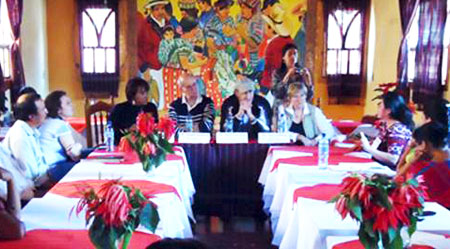The Health Policy Project ended in 2016. Work continued under Health Policy Plus (HP+) until 2022.
NEWS & VIEWS
USAID Deputy Administrator and the Assistant Administrator for Latin America Meet with Indigenous Men’s and Women’s Networks
Posted January 31, 2013
 |
At main table, from left to right: Yma Alfaro, USAID/Guatemala Health Project Management Specialist; Donald Steinberg, USAID Deputy Administrator; Mark Feierstein, USAID Assistant Administrator for Latin America; and Nancy Hoffman, USAID/Guatemala Deputy Mission Director exchange experiences with the members of the Indigenous Women's Group for Reproductive Health Education and Nutrition and Indigenous Men’s Group for Reproductive Health, Education and Nutrition during a visit to the municipality of Nebaj, Quiche.Photo by Marco Gálvez, Health and Education Policy Project. |
NEBAJ, Guatemala—In December 2012, the Health and Education Policy Project (HEPP) in Guatemala welcomed senior delegates from the U.S. Agency for International Development (USAID) to meet with the Indigenous Women and Men’s Networks for Health, Education, and Nutrition (known as REDMISAR and REDHOSEN, respectively). Donald Steinberg, Deputy Administrator for USAID, Mark Feierstein, Assistant Administrator for Latin America, and other USAID officials from Washington and Guatemala learned about the networks’ efforts to advocate for public policies that guarantee equitable, high-quality health and education services.
The networks shared their experiences and achievements in advocacy efforts for culturally appropriate health, education, and nutrition services that specifically target indigenous residents living in rural areas of Guatemala, where much of the population is poor. According to the U.N. Development Program’s 2009-2010 Human Development Report, approximately 80 percent of indigenous people live in poverty, compared to less than half of non-indigenous communities. In addition, these populations are often located beyond the reach of primary education and basic healthcare services administered by the Guatemalan government. When services are available, the quality is often not optimal and services are not always culturally sensitive.
Under the Health Policy Project (HPP), HEPP has conducted training workshops with REDMISAR and REDHOSEN members on their rights and entitlements regarding policies that govern health, nutrition, education, and social participation. Members of the indigenous networks have gained a better understanding of recent legislation on free access to information, decentralization initiatives, municipal codes, national budget information, and recent policy changes in reproductive health and education. As a result of the partnership with HEPP, these groups have been able to better use information and engage with policymakers to urge them to expand access to high-quality education and healthcare for indigenous citizens.
During the meeting with USAID officials, representatives from the indigenous networks explained how they have witnessed progress in raising the awareness of policymakers and service providers on the need to ensure equal access to health and education among their communities. They also reported positive strides in governance. Education and health service providers have gradually begun to accept increased monitoring and assume greater accountability for quality and equitability of the services offered, the groups reported.
Deputy Administrator Steinberg congratulated the two networks for their efforts and achievements, and emphasized the issue of women’s empowerment as one of the most important investments for the country’s development. While boys gain from education a great deal, Steinberg noted, both girls and the communities in which they live benefit when females are educated.
Read more about Health Policy Project activities in Guatemala
What's New
- Something to Build On: “Innovation Exchange” Celebrates the Health Policy Project’s Close and a New Beginning
- What Will it Take for Tanzania to Achieve ART Targets and Ensure Long-Term Sustainability of the HIV Response?
- Helping Kenya’s County Leaders Advocate for Increased Health Investments
- HPP Holds Working Meeting on Ensuring Responsible PEPFAR Transitions for Key Populations
- Health Policy Project Celebrates 2016 International Women's Day
- HPP Staff Participate in White House Conference on HIV Stigma Reduction

